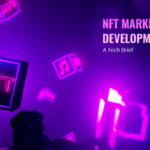
A Web3 Pro NFT Game Development Company Can Reshape The Future of Play-to-Earn in 2023
December 22, 2022
Build Your Fortune With NFT Marketplace Website Developer in 2023
December 23, 2022One of the numerous parties attempting to figure out how blockchain could be used to enhance the way they manage information, carry out transactions, and communicate with stakeholders is the health and life insurance industry. The key considerations revolve around whether blockchain’s special properties could assist insurers in reducing costs, managing risk, enhancing customer service, expanding their operations, and, eventually, boosting their bottom line. According to a Markets and Markets analysis, the global market for Blockchain in the insurance industry is predicted to grow from USD 64.50 million in 2018 to USD 1,393.8 million in 2025.
The insurance sector is converting to open information systems, open talent networks, and open technologies. In light of this situation, blockchain and smart contract technologies have the ability to completely automate the insurance industry while locking and releasing funds in response to predetermined conditions, dynamically pricing risk, and facilitating the emergence of new markets. Customers depend on Blockchain in health and life insurance transactions for financial security rather than insurance intermediaries.
Outlining Role of Blockchain in the Insurance Industry
Blockchain is a distributed ledger that keeps track of data records on decentralised machines that function as nodes. A shared single source of truth, the Blockchain is fully replicated on every node. By means of a procedure called mining, the nodes keep a copy of the ledger in addition to the cryptocurrency. When a majority of the nodes concur that the transaction is genuine, the ledger is updated to reflect the addition. The banking, financial services, and insurance (BFSI) industries are embracing Blockchain in the insurance sector more nowadays.
Traditional methods of upholding centralised information and trust have led to organizational-specific silos and technological system inefficiencies. But in a shared and collaborative economy, openness is the source of trust. Peer-to-peer replication allows participants in a blockchain to offer this by sharing an updated ledger each time a transaction takes place. By using Blockchain in the health and life insurance sector, transactions are made safe, verified, and verifiable, and network participants only see the bits of the ledger that are pertinent to them. Blockchain technology has the potential to help many incumbents overcome their competitive disadvantages, such as low consumer engagement, slow development in established businesses, and digitization tendencies. By automating critical processes, use cases associated with insurance are expected to benefit in terms of facilitating expansion, improving effectiveness, and cutting costs processes.
Develop your own blockchain in the insurance industry
Schedule Free DemoUtilizing Blockchain in Health and Life Insurance Sector
Let’s move on to real-world examples of businesses that have utilised Blockchain in the insurance industry for its revolutionary advantages.
- Lemonade: Lemonade leverages blockchain and AI to provide homeowners and renters with affordable insurance. Each monthly payment made by policyholders is deducted for a certain price, with the remaining funds going toward potential claims. When a claim is made, the blockchain’s smart contracts insurance instantly verifies the loss to ensure that the customer receives payment right away.
- Ryskex: Through blockchain in the insurance industry, Ryskex offers insurers a simpler approach to evaluating and managing risks effectively.
- B3i: Founded in 2018, B3i provides the insurance industry with top-notch solutions for customers by facilitating quicker insurance enrolment and lowering administrative expenses.
- ClaimShare: It is an app that combats double-dipping by utilising blockchain technology. One claimant collects payments falsely from several insurers for the same incident in this practice. By enabling various insurers to exchange information about submitted claims, ClaimShare hopes to reduce the likelihood of these pay-outs.
How Blockchain Revolutionized Health and Life Insurance Market?
Blockchain technology improved an insurance company’s operational processes as well as interactions with suppliers, intermediaries, and policyholders, raising the value of the product and setting the framework for more market competition among consumers. Costs should be reduced, operational efficiency should be increased, and connections with insured parties should be strengthened.
Integrating Blockchain in the insurance industry can assist in resolving the interoperability issue more effectively than current technologies due to the increased security and capacity to build trust between entities. Let’s discuss!
- Support administrative and strategic objectives
Blockchain could automatically gather records of contracts, transactions, and other valuable information sets. It could then link the information together and use smart contracts to take action on the data. - More effective fraud detection
Smart contracts can assist in determining whether fraudulent information supplied to a life or health insurer via bogus claims, fabricated applications, or other channels is indeed valid. - Enhancing the accuracy of provider directories
Unique provider directories could make use of the decentralised consensus protocols offered by the Blockchain in the insurance sector to make it simpler and faster for providers and insurers to update listings. - Making the application process more client-centric
Offering a more comprehensive, simple-to-access collection of medical information on a blockchain could bring comfort and peace of mind to what is already a burdensome and frequently disheartening application process for many. - Dynamic interaction between insurers and clients
The basis for integrating Blockchain in health and life insurance includes a wide range of wellness-related activities into the insurer/client dynamic. This might be electronic health records that are safely kept on a smart contract.
The Next Steps For Blockchain in the Insurance Sector
Even while blockchain technology has a number of advantages, we cannot deny that it also has some drawbacks. In the upcoming years, the blockchain’s user base will expand, making it more appealing to cyberattacks. Additionally, if events are not first recorded accurately, the veracity of the data that has been stored may be significantly questioned.
Transaction costs and complexity are added to the list of restrictions. The decision by insurance companies to use Blockchain in health and life insurance will have long-term effects because it will not only allow for the efficient delivery of services but also make it easier for insurance businesses to comply with regulatory requirements.
Before drafting a long-term plan to deploy blockchain technology, insurers, in the opinion of McKinsey, must make an effort to thoroughly comprehend its benefits and constraints. The high-impact areas that will benefit from Blockchain in the insurance industry must be identified by insurers. Prior to carrying out a full-scale implementation, it is necessary to verify internal proofs-of-concept, prototypes, and customer processes. If the technology is introduced gradually, blockchain could eventually find extensive use in the insurance industry.
Conclusion
Although blockchain technology is still in its infancy, the insurance sector has already used it in a number of use cases and applications. The insurance sector benefits from the technology’s accuracy, efficiency, privacy, and other features. It’s crucial to realise, though, that insurance businesses using blockchain services must consent to conduct business ethically. In order to employ blockchain in health and life insurance properly, insurance companies must offer regulatory frameworks. Once these requirements are satisfied, blockchain technology has the potential to completely change the insurance sector for both customers and insurers.
Using Blockchain in the insurance industry is great for data sharing, collaboration, and streamlining user-friendly insurance operations, standards and procedures in line. It can alter how physical assets are digitally recorded, managed, and insured. Antier’s highly qualified staff not only guides you into the world of decentralised solutions but also assists you in navigating challenging circumstances along the way. Connect with us to learn more!



